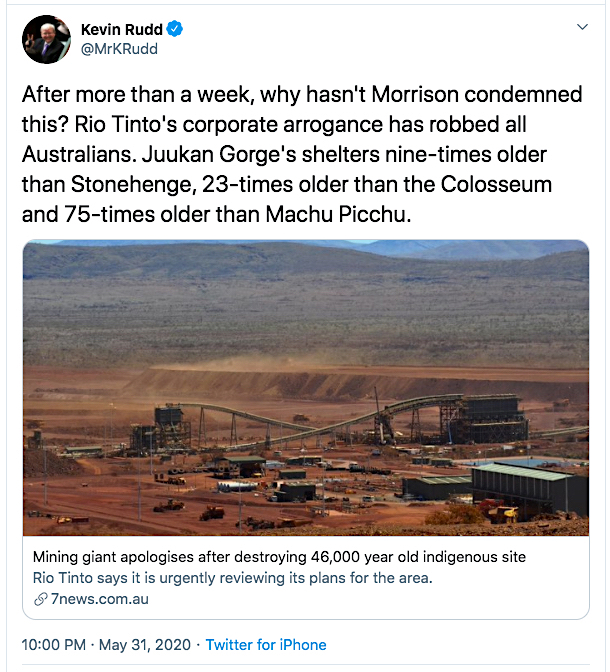Rio Tinto (ASX, LON, NYSE: RIO) has apologized for accidentally blowing up a 46,000-year-old sacred indigenous site with dynamite while carrying out work to expand its iron ore operation in Australia’s Pilbara region.
The world’s second largest miner destroyed two ancient caves last week in Juukan Gorge, about 1,075 km (667 miles) north of Perth. The rock shelters contained artifacts considered evidence of continual habitation dating back 46,000 years.
Rio was carrying out work to expand its iron ore operation in Australia’s Pilbara region.
Among them, there was 4,000-year-old plaited human hair with genetic links to the present day traditional owners, the Puutu Kunti Kurrama and Pinikura (PKKP) people, ABC News reported.
“They were not only extremely important sites for Aboriginal communities, but also they were extremely important sites for archaeological understanding of the distant past in Australia,” Peter Stone, the UNESCO chair in Cultural Property Protection and Peace at Newcastle University in the UK told the news outlet.
Rio was granted approval for work at the Brockman 4 iron ore project in 2013. Subsequent archaeological excavation revealed ancient artifacts including grinding stones, a bone sharpened into a tool and 4,000-year-old braided hair.
Reviewing Juukan Gorge area plans
“We are sorry for the distress we have caused,” Rio Tinto Iron Ore chief executive, Chris Salisbury, said in a statement on Sunday.
“Our relationship with the PKKP matters a lot to Rio Tinto, having worked together for many years.
“We will continue to work with the PKKP to learn from what has taken place and strengthen our partnership.
“As a matter of urgency, we are reviewing the plans of all other sites in the Juukan Gorge area.”

Former Prime Minister Kevin Rudd, the country’s first leader to apologize to generations of Aboriginal and Torres Strait Islander children forcefully taken from their parents by white Australians last century, said Rio Tinto’s “corporate arrogance had robbed all Australians.”
“Juukan Gorge’s shelters [are] nine-times older than Stonehenge, 23-times older than the Colosseum and 75-times older than Machu Picchu,” he posted on his official Twitter account.
The state government hopes to pass its new Aboriginal cultural heritage bill this year, although the coronavirus pandemic has delayed the consultation process.
